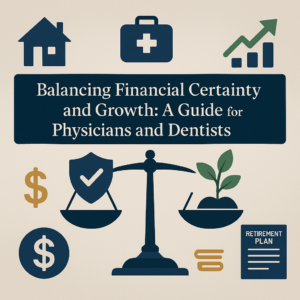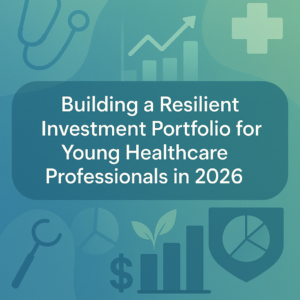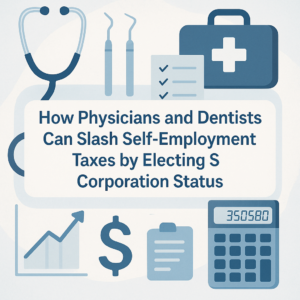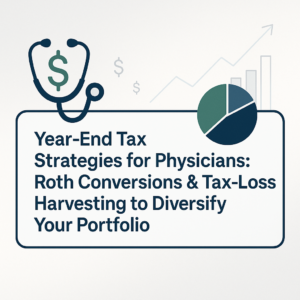As a healthcare professional, you spend your days caring for others. Your busy schedule and unique financial situation can make it challenging to prioritize your own financial health. Between managing high student loan debt, balancing a demanding career, and planning for the future, navigating your financial journey alone can be overwhelming. Personalized financial planning can help you manage these challenges with confidence and peace of mind.
In this comprehensive guide, we’ll explore the value of personalized financial planning and provide actionable tips to maximize your financial health. Whether you’re a physician, dentist, pharmacist, physical therapist, or psychologist, this guide will equip you with the knowledge and tools to take control of your finances and achieve your financial goals. With effective financial planning, you can reduce stress and focus more on your demanding career, knowing your financial future is secure.
What is Asset Management?
Asset management involves developing, operating, maintaining, and selling assets cost-effectively. For young healthcare professionals, managing your assets can include investments, real estate, retirement accounts, and other financial resources.
Why is Asset Management Crucial for Young Professionals?
Asset management is essential for young professionals for several reasons:
- Building Wealth: Proper asset management helps you accumulate and grow your wealth over time.
- Risk Management: Diversifying your assets reduces the risk of significant financial loss.
- Tax Efficiency: Strategic asset management can help you minimize tax liabilities.
- Achieving Financial Goals: Whether it’s buying a home, funding education, or planning for retirement, asset management aligns your resources with your goals.
Benefits of a Well-Structured Asset Management Plan
A well-structured asset management plan offers numerous benefits:
- Financial Security: Knowing your assets are well-managed provides financial security and peace of mind.
- Higher Returns: Effective asset management strategies can lead to higher investment returns.
- Flexibility: A diversified asset portfolio provides financial flexibility to adapt to changing circumstances.
- Legacy Planning: Proper asset management ensures you can leave a meaningful legacy for your loved ones.
The Power of Personalized Financial Planning
Personalized financial planning tailors your financial strategy to your specific needs, goals, and circumstances. Unlike generic financial advice, personalized planning considers your unique situation, including your profession, income, expenses, and future aspirations.
Personalized financial planning can generate significant value in various ways:
- Optimizing Savings: By identifying areas for improvement, you can save more annually.
- Debt Management: Personalized plans help you manage and reduce debt efficiently.
- Investment Strategies: Tailored investment strategies align with your risk tolerance and goals.
- Expense Reduction: Identifying and cutting unnecessary expenses frees up more money for savings and investments.
Examples of Potential Savings and Optimizations
Here are some practical examples of how personalized financial planning can lead to savings and optimizations:
- Refinancing Student Loans: Healthcare professionals often carry significant student loan debt. Refinancing your loans at a lower interest rate can save you thousands of dollars in interest payments over time.
- Tax-Advantaged Accounts: Maximizing contributions to retirement accounts like 401(k)s, IRAs, and Health Savings Accounts (HSAs) can reduce your taxable income and boost your retirement savings.
- Insurance Review: Regularly reviewing your insurance policies ensures you have adequate coverage without overpaying for premiums. This includes health, disability, and life insurance.
- Investment Asset Allocation: Diversifying your investments across various asset classes reduces risk and enhances potential returns.
Common Financial Pitfalls for Healthcare Professionals
Healthcare professionals may face several common financial pitfalls:
- High Student Loan Debt: Managing substantial student loan debt can be overwhelming and impact your financial stability.
- Living Paycheck to Paycheck: Despite high incomes, some healthcare professionals struggle to save and build wealth.
- Lack of Investment Diversification: Overconcentration in specific investments can increase risk.
- Inadequate Emergency Fund: Without a sufficient emergency fund, unexpected expenses can derail your financial plans.
- Insufficient Insurance Coverage: Failing to have adequate insurance can leave you vulnerable to financial loss.
Advantages of Working with a Financial Advisor
Hiring a financial advisor who understands the specific needs of healthcare professionals offers several advantages:
- Expert Guidance: Financial advisors provide expert advice tailored to your unique financial situation.
- Goal Setting: Advisors help you set realistic financial goals and develop actionable plans to achieve them.
- Stress Reduction: Delegating financial planning to a professional reduces stress and allows you to focus on your career and personal life.
- Comprehensive Planning: Financial advisors consider all aspects of your financial life, including investments, insurance, taxes, and estate planning.
- Accountability: Advisors hold you accountable for implementing your financial plan and staying on track.
Personalized Advice Across Different Areas
A specialized financial advisor can offer personalized advice in areas such as:
- Retirement Planning: Developing a robust retirement plan ensures you have enough savings to maintain your desired lifestyle.
- Tax Strategies: Advisors can recommend tax-efficient strategies to minimize tax liabilities and maximize after-tax returns.
- Investment Planning: Tailored investment plans align with your risk tolerance, time horizon, and financial goals.
- Debt Management: Effective debt management strategies help you pay off debt faster and save on interest costs.
- Estate Planning: Advisors help you create a comprehensive estate plan to ensure your assets are distributed according to your wishes.
Finding the Right Financial Advisor
When selecting a financial advisor, consider the following factors:
- Credentials: Look for advisors with recognized credentials, such as Certified Financial Planner (CFP), Chartered Financial Analyst (CFA), or similar qualifications.
- Experience: Choose an advisor with experience working with healthcare professionals and an understanding of the unique financial challenges you face.
- Transparency: Ensure the advisor operates with transparency and discloses any potential conflicts of interest.
- Compatibility: Find an advisor whose communication style and approach align with your preferences.
- Fee Structure: Understand the advisor’s fee structure, whether they charge flat fees, hourly rates, or commissions, and ensure it aligns with your budget.
Open Communication
To foster transparency, encourage open communication with your financial advisor:
- Ask Questions: Don’t hesitate to ask questions about your financial plan, investments, fees, and advisor recommendations.
- Request Clarifications: If something isn’t clear, request further explanations until you fully understand.
- Regular Updates: Schedule regular meetings with your advisor to review your financial progress and make any necessary adjustments.
- Provide Feedback: Share your feedback, concerns, and preferences with your advisor to ensure your financial plan aligns with your goals.
Actionable Checklist for Transparency and Communication
- Compile Questions: Prepare a list of questions to ask your advisor during your next meeting.
- Review Statements: Regularly review your financial statements and seek clarification on any discrepancies.
- Schedule Reviews: Set up regular financial reviews with your advisor to stay updated on your financial progress.
- Feedback Loop: Establish a feedback loop with your advisor to continuously improve your financial plan.
How Financial Planning Tools Enhance Planning
Financial tools offer several benefits:
- Efficiency: Automates tasks like budgeting, tracking expenses, and investment management.
- Visualization: Provides visual representations of your financial data, making it easier to understand your financial situation.
- Goal Tracking: Helps you set and track your financial goals, ensuring you stay on course.
- Customized Insights: Offers personalized insights and recommendations based on your financial data and goals.
Step-by-Step Guide to Using RightCapital (our preferred tool!)
Step 1: Create an Account: Sign up for an account for free.
Step 2: Input Financial Information: Enter your financial data, including income, expenses, assets, liabilities, and goals.
Step 3: Customize Your Plan: Work with your financial advisor or on your own to develop a financial plan based on your input data.
Step 4: Track Progress: Use RightCapital’s tools to monitor your financial progress and make adjustments as needed.
Step 5: Review and Update: Regularly review and update your financial plan to ensure it remains aligned with your goals and circumstances.
Note: The link above is sponsored by Mainstay Capital. Your information will be visible to us and we will reach out to ask if you’d like an introductory meeting with an advisor. However, it is completely free for you to use on your own without professional assistance.
Insurance Planning
Insurance is a critical component of a comprehensive financial plan. It provides a safety net to protect against unforeseen risks and financially devastating events.
Health Insurance
Health insurance is essential to cover medical expenses and protect against high healthcare costs. As a healthcare professional, you may have access to employer-sponsored plans or individual health insurance options.
Disability Insurance
Disability insurance provides income replacement if you are unable to work due to illness or injury. Given the physical demands and potential risks in healthcare professions, disability insurance is particularly important.
Life Insurance
Life insurance ensures that your loved ones are financially protected in the event of your passing. It can cover debts, living expenses, and provide for future needs.
Steps to Optimize Insurance Coverage
- Assess Needs: Evaluate your insurance needs based on your financial situation, dependents, and potential risks.
- Compare Policies: Shop around for policies that offer the best coverage at competitive rates.
- Review Regularly: Periodically review your insurance policies to ensure they continue to meet your needs.
- Consult an Advisor: Work with a financial advisor or insurance agent to select appropriate coverage.
Estate Planning
Estate planning involves preparing for the distribution of your assets after your passing. It ensures your wishes are respected and helps minimize legal complications and taxes for your beneficiaries.
Why Estate Planning Matters for Young Professionals
Even as a young healthcare professional, estate planning is important. It provides peace of mind knowing your assets will be handled according to your wishes and can protect your loved ones from financial and legal burdens.
Wills and Trusts
- Purpose: Specifies how your assets should be distributed and who will manage your estate.
- Action Steps: Create a will or trust with the help of an estate planning attorney.
Power of Attorney
- Purpose: Designates someone to make financial or medical decisions on your behalf if you become incapacitated.
- Action Steps: Assign a trusted person as your power of attorney.
Beneficiary Designations
- Purpose: Ensures your assets, like retirement accounts and life insurance, are passed to your chosen beneficiaries.
- Action Steps: Regularly update beneficiary designations to reflect your current wishes.
Health Care Directive
- Purpose: Outlines your medical treatment preferences if you become unable to communicate them.
- Action Steps: Create a health care directive and provide copies to your health care provider and family.
Personalized financial planning is a powerful tool that can help young healthcare professionals achieve financial health and peace of mind. By understanding asset management, creating value through tailored financial strategies, identifying areas for improvement, and working with a knowledgeable financial advisor, you can optimize your finances and reach your financial goals.
Take the first step toward financial health by booking a consultation with a financial advisor specializing in the needs of healthcare professionals. Start your journey today and secure a prosperous future for yourself and your loved ones.
Disclaimer: The information provided in this blog is for educational purposes only and does not constitute financial advice. Please consult a qualified financial advisor for personalized advice tailored to your specific financial situation.
No Guarantee of Results: While we strive to provide accurate and valuable information, we cannot guarantee specific financial outcomes or benefits. Savings and optimizations will vary based on individual circumstances.
Transparency Statement: Mainstay Capital may have partnerships or affiliations with some of the financial tools mentioned in this blog. We ensure full transparency and recommend these tools based on their potential benefits to our readers.






